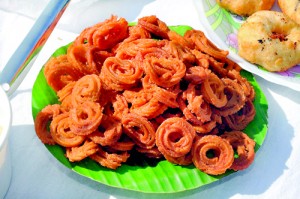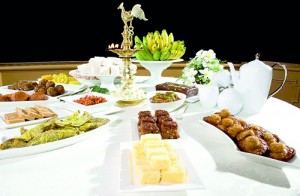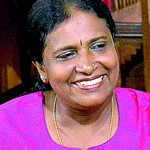Bonding time, families and communities
When Kamala Kumara was a lass, the Avurudu ganudenu (exchange) was not just for bright-eyed young children eagerly awaiting some pocket money. It was a custom for the great outdoors as well- in particular, for the dark depths of the Kalu Ganga that snakes its way through the Kalutara town. “Many villagers would go down to the river with a pot of water that they had obtained the previous year,” she remembers. “They would exchange that water with the river, obtaining a new pot of water to keep in their homes for another year.” It was a way of thanking the river for enriching their land and keeping them in good health, she smiles. “Even nature likes praise.”
Today she finds herself unable to follow this tradition- it might have something to do with the fact that the Kalu Ganga is in Kalutara and Kamala Kumara is not in Kalutara anymore. A blissful marriage and three children later, though now living in the heart of Colombo in Thimbirigasyaya, Mrs. Kumara remains faithful to all the other customs she grew up with. Amongst them perhaps the strongest is an inbred nature of nurture, which is the “real spirit of Avurudu,” she smiles. “Almost every other holiday is based on religion. It’s lovely to have a holiday that transcends these beliefs and can be celebrated by everyone.”
In the Kumara household the Avurudu season has officially begun. This is how it has always been for Kamala, who grew up in a household with strong cultural beliefs. Her father being the headmaster in the school and her mother a teacher, and both community leaders, Avurudu was a major celebration in her childhood home. “My parents felt like they had to set a good example, so we always celebrated the day in an extravagant way,” she says. “All of the customs were followed to the dot. Today I feel like I have to set that same example for my family.” For the household the season starts on a somewhat sombre note, though, as every year they remember the passing of Mr. Kumara on March 30, with an overnight chanting of Pirith and almsgiving.
 The making of the sweetmeats (undeniably the best thing about Avurudu, if you ask us!) begins the week before the day in question. Some are made even earlier, as things like Panaa Kevum needs time for the flavours to sink in before they’re refried and dipped in sugar syrup. The other sweetmeats, like Kevum, Kokis and Asmi are all made by Mrs. Kumara at home. “My family won’t eat anything bought from outside. I occasionally get calls from the nephews and nieces who are flying in from abroad to make their favourite sweetmeats for them to enjoy when they arrive!” Although there’s something even Mrs. Kumara is stumped by and that’s the making of the famously tricky Konde Kevum. “It’s such a hassle to get that right so I usually place an order.”
The making of the sweetmeats (undeniably the best thing about Avurudu, if you ask us!) begins the week before the day in question. Some are made even earlier, as things like Panaa Kevum needs time for the flavours to sink in before they’re refried and dipped in sugar syrup. The other sweetmeats, like Kevum, Kokis and Asmi are all made by Mrs. Kumara at home. “My family won’t eat anything bought from outside. I occasionally get calls from the nephews and nieces who are flying in from abroad to make their favourite sweetmeats for them to enjoy when they arrive!” Although there’s something even Mrs. Kumara is stumped by and that’s the making of the famously tricky Konde Kevum. “It’s such a hassle to get that right so I usually place an order.”
The Avurudu table in the household must always be ‘opened’ by a prosperous relative or friend of good character as this is considered good luck for the family. It is only then that the food is shared with others and plates are passed around. For Kamala these customs are not just something to be adhered to but a way of life. “I always feel that if we don’t keep to the customs and the auspicious times something bad will happen to my family,” she muses. “It’s just a gut feeling.” This is why some years ago, when her husband insisted the family go to Nuwara Eliya after Avurudu she in turn insisted that the family make a pit stop in Kithulgala for the anointing of oil

Kamala Kumara
which traditionally falls on the day after Avurudu. “So there we were on the side of the road, with the Naanu (herbal mixture) in hand and leaves temporarily held above the kids’ heads, making sure we kept to the traditions!” she laughs.
There’s a Bulath Heppuwa on her coffee table during the season that everyone, including the hip young things, will take a small bite from. It’s a sign of respect for the host- a willingness to adapt to their ways. Kamala delights in having her extended family (her eldest Uthpala has married and has two children, while youngest Thara has already flown in from Singapore and Kosala will fly in from New York) and friends gathered at her household for Avurudu and the dinner that follows, just like they always have. “It’s so lovely to see everyone just relaxing, and the little tots running around. They’ll be the ones taking up the traditions after us one day. There’s this amazing sense of continuity, of customs and values being passed down from generation to generation.”
For Vasuki Premachandra the New Year, or ‘putthaandhu’, is just one amongst a host of celebrations that she is part of in her community. The Premachandra family has a calendar crisscrossed with dates for Thai Pongal, the April new year, Ramazaan, Deepavali and Christmas thanks to living in a vibrant multicultural community.

Vasuki Premachandra
“The Sinhala and Tamil New Year is like our second celebration of the dawning of New Year,” she shares. “But that doesn’t mean we celebrate it any less.”
A nursery teacher by profession this is also her vacation of sorts. Vasuki used to be a banker and joined the teaching profession because her husband was in the army. “I wanted to be there for the kids as much as possible,” she says. Today, of course, with her son Arjuna and daughter Bharathi abroad and youngest Pathanchali well into university she finds a little more time for herself but says it’s always lovely to have the entire family together. During the April holidays she’s usually surrounded by her family and that’s why New Year is a more special celebration.
While she grew up in Colombo Vasuki remembers the more colourful New Year holidays she spent with her relations in Jaffna. For the young Vasuki and her cousins the holidays were heaven on a plate-quite literally for sweetmeats would be made in ample quantities to feed the frequent visitors and family members! Add to that the elaborate Kai Visaesham (exchange of gifts, or ganudenu) ceremony and the young members of the family would indeed have a very prosperous New Year.
Jaffna households are large and people often gather in one place for the making of these sweetmeats. While customs are followed it’s this that makes the New Year such a communal holiday around the country, smiles Vasuki. “This is probably why most traditions aren’t practised by the young generation today,” adds Pathanchali, her youngest. “Back in the day, relations lived in close proximity to each other and during festival times-be it New Year or even a birthday- everyone got together for preparation of the event. The younger ones learnt respect for their elders and how to work together. The family spirit was strong-it still is pretty strong but now with most relations abroad and living at great distance from each other I guess we don’t really get the opportunity anymore.”
Today, of course, their New Year celebrations are smaller but no less inclusive. The season begins as it does for most households, with the entire household engaging in a robust cleaning spell. The task falls mainly to Pathanchali while the laborious process of making the sweetmeats is expertly handled by Vasuki. This is her favourite tradition of the new year- if she even had to pick one. The Premachandra New Year table will usually be laden with Pongal, a sweeter version of the traditional milk rice, and an assortment of other goodies like crispy, fluffy Vadai, crunchy Murukku and sweet yellow orbs of Laddu. You won’t find Vasuki buying her Avurudu goodies from the shops, that’s for sure.
“The Vadai, especially, has to be just right.” Crispy, thin skin on the outside and fluffy steamed dough inside- we agree. “Otherwise it just doesn’t taste right.” For both Vadai and Pongal Vasuki uses a recipe passed down from her grandmother to her mother and now her. One day, her children will take on the challenge of making Vadai as good as their mother’s was. “We’ll see,” she laughs. In addition, the table is also laden with fruits that are blessed by the temple- they are later eaten by the family for good health and prosperity.
The day begins with a bathing ritual after the application of sacred oil received from the Kovil, and then Pongal is made. Following observance of the auspicious times, visits to family and friends will usually follow. Since their family members are mostly settled abroad, the Premachandra family spend some part of their new year with Sinhalese friends as the auspicious times vary-this year’s will be no different. “It makes life so much more colourful,” they smile.


